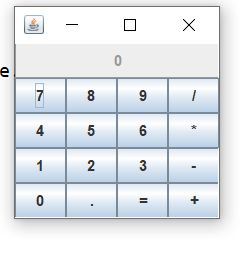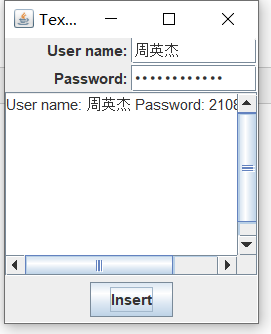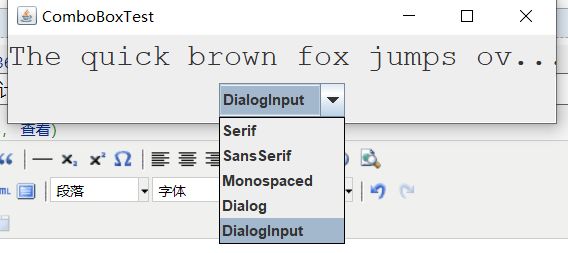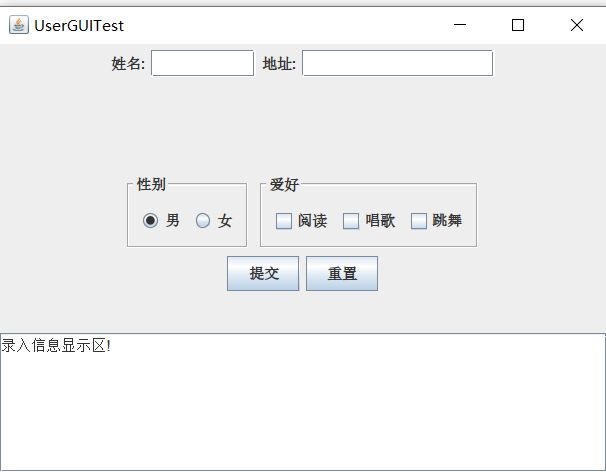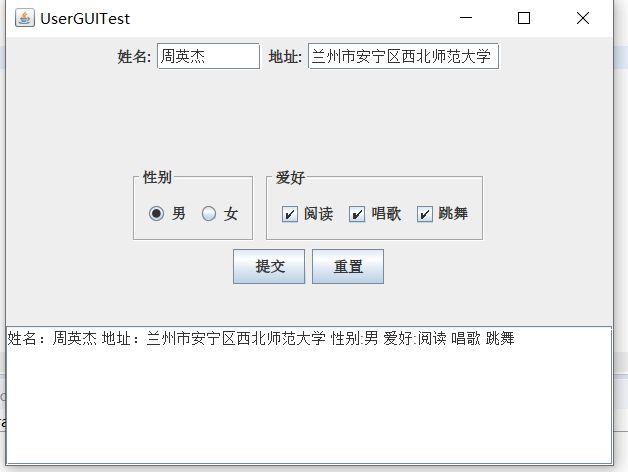| 项目 |
内容 |
| 这个作业属于哪个课程 |
|
| 这个作业的要求在哪里 |
|
| 作业学习目标 |
(1)掌握GUI布局管理器用法; (2)掌握Java Swing文本输入组件用途及常用API; (3)掌握Java Swing选择输入组件用途及常用API。 |
第一部分:总结第十二章本周理论知识
(1)GUI布局管理器用法;
一>FlowLayout(流式布局)
1>特点:
a、流式布局会将组件按照顺序从左到右添加;
b、当一行排满后会自动换行。
2>构造方法:
FlowLayout( );
FlowLayout( int aligh );
FlowLayOut(int aligh,int hgap,int vgap);
其中,参数aligh决定组件在容器中的对其方式,可选的值为:
CENTER:居中对齐(默认方式);
LEFT:左对齐;
RIGHT:右对齐;
LEADING:与容器方向的开始边对齐;
TRAILING:与容器方向的结束边对齐;
二>BorderLayout(边界布局)
1>特点:
a、边界布局将容器划分为五个区域,分别为东(EAST)、南(SOUTH)、西(WEST)、北(NORTH)、中(CENTER);
b、容器大小调整时,边界布局NORTH和SOUTH区域高度不变长度跟随变化,EAST和WEST长度不变高度跟随变化;
c、容器添加组件时,需调用add(Component comp,Object constraints)方法,constraints可选值为BorderLayout类的五个常数:EAST、WEST、SOUTH、NORTH、CENTER;
2>构造方法:
BorderLayout( );
BorderLayout(int hgap ,int vgap);
参数hgap和vgap分别设定组件之间的水平和垂直间隙,默认值为5像素。
三>CardLayout(卡片布局)
1>特点:
a、卡片布局管理器将容器中的每个组件看作一张卡片,任何时候一次只能看到一张卡片,这张卡片占据整个容器;
b、卡片的顺序由组件对象本身在容器内部的顺序决定;
c、通过调用previous(Container parent),next(Container parent),show(Container parent,String name)方法来切换卡片。其中name参数可通过调用add(Component comp,Object constraints)方法来设定。
2>构造方法:
CardLayout( );
CardLayout(int hgap ,int vgap);
参数hgap和vgap分别设定组件之间的水平和垂直间隙,默认值为5像素。
四>GridLayout(网格布局)
1>特点:
a、网格布局将容器划分为n行m列大小相等的网格,一个网格只能放置一个组件,且各组件大小一样;
b、通过构造方法设定行数和列数为非零值时,指定的列数将被忽略,列数通过指定的行数和布局中的组件总数来确定;
c、网格布局添加组件的默认顺序为从左到右,从上到下;
2>构造方法:
GridLayout( );
GridLayout( int rows ,int cols );
GridLayOut(int rows , int cols,int hgap , int vgap);
参数rows和cols分别指定网格布局的行数和列数,参数hgap和vgap分别设定组件之间的水平和垂直间隙;
(2)Java Swing文本输入组件用途及常用API;
1>文本框(JTextField和JPasswordField)
JTextField组件用于创建文本框。文本框是用来接收用户的单行文本信息输入的区域。通常文本框用于接收用户信息或其他文本信息的输入。当用户输入文本信息后,如果为JTextField对象添加了事件处理,按回车键后就会触发一定的操作。
JPasswordField是JTextField的子类,是一种特殊的文本框,也是用来接收单行文本信息输入的区域,但是会用回显字符串代替输入的文本信息。因此,JPasswordField组件也称为密码文本框。JPasswordField默认的是回显字符是”*”,用户可以自行设置回显字符。
JTextField的常见构造方法有如下几种:
- JTextField():创建一个空文本框。
- JTextField(String text):创建一个具有出事文本信息text的文本框。
- JTextField(String text,int columns):创建一个具有出事文本信息text以及制定列数的文本框。
JTextField的常用方法:
- void setText(String):设置显示内容。
- String getText():获取显示内容。
JPasswordField的构造方法有如下几种:
- JPasswordField():创建一个空的密码文本框。
- JPasswordField(String text):创建一个指定初始文本信息的密码文本框。
- JPasswordField(String text,int columns):创建一个指定文本和列数的密码文本框。
- JPasswordField(int columns):创建一个指定列数的密码文本框。
JPasswordField是JTextField的子类,因此JPasswordField也具有与JTextField类似的名称和功能的方法,此外,它还具有与JTextField类似的名称和功能的方法,此外,它还具有自己的独特方法:
- boolean echoCharIsSet():获取设置回显字符的状态。
- void setEchoChar(char):设置回显字符。
- void getEchoChar():获取回显字符。
- char[] getPassword():获取组件的文本。
(3)掌握Java Swing选择输入组件用途及常用API。
1>单选按钮(JRadioButton)
JRadioButton组件实现的是一个单选按钮。JRadioButton类可以单独使用,也可以与ButtonGroup类联合使用,当单独使用时,该单选按钮可以被选定和取消选定;当与ButtonGroup类联合使用,需要使用add()方法将JRadioButton添加到ButtonGroup中,并组成一个单选按钮组。此时用户只能选定按钮组中的一个单选按钮。
JRadioButton组件的常用方法:
- setText(String text):设置单选按钮的标签文本。
- setSelected(boolean b):设置单选按钮的状态,默认情况下未被选中,当设为true时表示单选按钮被选中。
- add(AbatractButton b):添加按钮到按钮组中。
- remove(AbatractButton b):从按钮组中移除按钮。
- getButtonCount():返回按钮组中包含按钮的个数,返回值为int型。
- getElements():返回一个Enumeration类型的对象,通过该对象可以遍历按钮组中包含的所有按钮对象。
- isSelected():返回单选按钮的状态,当设为true时为选中。
- setSelected(boolean b):设定单选按钮的状态。
2>复选框(JCheckBox)
使用复选框可以完成多项选择。Swing中的复选框与awt中的复选框相比,优点是Swing复选框中可以添加图片。复选框可以为每一次的单击操作添加一个事件。
复选框的构造方法如下。
- JCheckBox(Icon icon):创建一个有图标,但未被选中的复选框。
- JCheckBox(Icon icon,boolean selected):创建一个有图标复选框,并且制定是否被选中。
- JCheckBox(String text):创建一个有文本,但未被选中的复选框。
- JCheckBox(String text,boolean selected):创建一个有文本复选框,并且制定是否被选中。
- JCheckBox(String text,Icon icon):创建一个指定文本和图标,但未被选中的复选框。
- JCheckBox(String text,Icon icon,boolean selected):创建一个指定文本和图标,并且制定是否被选中的复选框。
常用方法:
- public boolean isSelected():返回复选框状态,true时为选中。
- public void setSelected(boolean b):设定复选框状态。
3>组合框(JComboBox)
JComboBox组件用来创建组合框对象。通常,根据组合框是否可编辑的状态,可以将组合框分成两种常见的外观。可编辑状态外观可视为文本框和下拉列表的组合,不可编辑状态的外观可视为按钮和下拉列表的组合。在按钮或文本框的右边有一个带三角符号的下拉按钮,用户可以单击该下拉按钮,便可出现一个内容列表,这也是组合框的得名。组合框通常用于从列表的”多个项目中选择一个”的操作。
JComboBox的构造方法有如下几种:
- JComboBox():创建一个默认模型的组合框。
- JComboBox(ComboBoxModel aModel):创建一个指定模型的组合框。
JComboBox(Object[] items):创建一个具有数组定义列表内容的组合框。
第二部分:实验部分
实验1:测试程序1
测试代码:
import java.awt.*; import java.awt.event.*; import javax.swing.*; /** * A panel with calculator buttons and a result display. */ public class CalculatorPanel extends JPanel { private JButton display; private JPanel panel; private double result; private String lastCommand; private boolean start; public CalculatorPanel() { setLayout(new BorderLayout()); result = 0; lastCommand = "="; start = true; // add the display display = new JButton("0"); display.setEnabled(false); add(display, BorderLayout.NORTH); var insert = new InsertAction(); var command = new CommandAction(); // add the buttons in a 4 x 4 grid panel = new JPanel(); panel.setLayout(new GridLayout(4, 4)); panel.setLocation(200, 300);; addButton("7", insert); addButton("8", insert); addButton("9", insert); addButton("/", command); addButton("4", insert); addButton("5", insert); addButton("6", insert); addButton("*", command); addButton("1", insert); addButton("2", insert); addButton("3", insert); addButton("-", command); addButton("0", insert); addButton(".", insert); addButton("=", command); addButton("+", command); add(panel, BorderLayout.CENTER); } /** * Adds a button to the center panel. * @param label the button label * @param listener the button listener */ private void addButton(String label, ActionListener listener) { var button = new JButton(label); button.addActionListener(listener); panel.add(button); } /** * This action inserts the button action string to the end of the display text. */ private class InsertAction implements ActionListener { public void actionPerformed(ActionEvent event) { String input = event.getActionCommand(); if (start) { display.setText(""); start = false; } display.setText(display.getText() + input); } } /** * This action executes the command that the button action string denotes. */ private class CommandAction implements ActionListener { public void actionPerformed(ActionEvent event) { String command = event.getActionCommand(); if (start) { if (command.equals("-")) { display.setText(command); start = false; } else lastCommand = command; } else { calculate(Double.parseDouble(display.getText())); lastCommand = command; start = true; } } } /** * Carries out the pending calculation. * @param x the value to be accumulated with the prior result. */ public void calculate(double x) { if (lastCommand.equals("+")) result += x; else if (lastCommand.equals("-")) result -= x; else if (lastCommand.equals("*")) result *= x; else if (lastCommand.equals("/")) result /= x; else if (lastCommand.equals("=")) result = x; display.setText("" + result); } }
运行结果:
实验1:测试程序2
实验代码:
运行结果:
实验1:测试程序3
实验代码:
package checkBox; import java.awt.*; import java.awt.event.*; import javax.swing.*; /** * A frame with a sample text label and check boxes for selecting font * attributes. */ public class CheckBoxFrame extends JFrame { private JLabel label; private JCheckBox bold; private JCheckBox italic; private static final int FONTSIZE = 24; public CheckBoxFrame() { // add the sample text label label = new JLabel("The quick brown fox jumps over the lazy dog."); label.setFont(new Font("Serif", Font.BOLD, FONTSIZE)); add(label, BorderLayout.CENTER); // this listener sets the font attribute of // the label to the check box state ActionListener listener = event -> { int mode = 0; if (bold.isSelected()) mode += Font.BOLD; if (italic.isSelected()) mode += Font.ITALIC; label.setFont(new Font("Serif", mode, FONTSIZE)); }; // add the check boxes var buttonPanel = new JPanel(); bold = new JCheckBox("Bold"); bold.addActionListener(listener); bold.setSelected(true); buttonPanel.add(bold); italic = new JCheckBox("Italic"); italic.addActionListener(listener); buttonPanel.add(italic); add(buttonPanel, BorderLayout.SOUTH); pack(); } }
运行结果:
实验1:测试程序4
运行代码:
import java.awt.*; import java.awt.event.*; import javax.swing.*; /** * A frame with a sample text label and radio buttons for selecting font sizes. */ public class RadioButtonFrame extends JFrame { private JPanel buttonPanel; private ButtonGroup group; private JLabel label; private static final int DEFAULT_SIZE = 36; public RadioButtonFrame() { // add the sample text label label = new JLabel("The quick brown fox jumps over the lazy dog."); label.setFont(new Font("Serif", Font.PLAIN, DEFAULT_SIZE)); add(label, BorderLayout.CENTER); // add the radio buttons buttonPanel = new JPanel(); group = new ButtonGroup(); addRadioButton("Small", 8); addRadioButton("Medium", 12); addRadioButton("Large", 18); addRadioButton("Extra large", 36); add(buttonPanel, BorderLayout.SOUTH); pack(); } /** * Adds a radio button that sets the font size of the sample text. * @param name the string to appear on the button * @param size the font size that this button sets */ public void addRadioButton(String name, int size) { boolean selected = size == DEFAULT_SIZE; var button = new JRadioButton(name, selected); group.add(button); buttonPanel.add(button); // this listener sets the label font size ActionListener listener = event -> label.setFont(new Font("Serif", Font.PLAIN, size)); button.addActionListener(listener); } }
运行结果:
实验1:测试程序5
实验代码:
import java.awt.*; import javax.swing.*; import javax.swing.border.*; /** * A frame with radio buttons to pick a border style. */ public class BorderFrame extends JFrame { private JPanel demoPanel; private JPanel buttonPanel; private ButtonGroup group; public BorderFrame() { demoPanel = new JPanel(); buttonPanel = new JPanel(); group = new ButtonGroup(); addRadioButton("Lowered bevel", BorderFactory.createLoweredBevelBorder()); addRadioButton("Raised bevel", BorderFactory.createRaisedBevelBorder()); addRadioButton("Etched", BorderFactory.createEtchedBorder()); addRadioButton("Line", BorderFactory.createLineBorder(Color.BLUE)); addRadioButton("Matte", BorderFactory.createMatteBorder(10, 10, 10, 10, Color.BLUE)); addRadioButton("Empty", BorderFactory.createEmptyBorder()); Border etched = BorderFactory.createEtchedBorder(); Border titled = BorderFactory.createTitledBorder(etched, "Border types"); buttonPanel.setBorder(titled); setLayout(new GridLayout(2, 1)); add(buttonPanel); add(demoPanel); pack(); } public void addRadioButton(String buttonName, Border b) { var button = new JRadioButton(buttonName); button.addActionListener(event -> demoPanel.setBorder(b)); group.add(button); buttonPanel.add(button); } }
运行结果:
实验1:测试程序6
实验代码:
package comboBox; import java.awt.BorderLayout; import java.awt.Font; import javax.swing.JComboBox; import javax.swing.JFrame; import javax.swing.JLabel; import javax.swing.JPanel; /** * A frame with a sample text label and a combo box for selecting font faces. */ public class ComboBoxFrame extends JFrame { private JComboBoxfaceCombo; private JLabel label; private static final int DEFAULT_SIZE = 24; public ComboBoxFrame() { // add the sample text label label = new JLabel("The quick brown fox jumps over the lazy dog."); label.setFont(new Font("Serif", Font.PLAIN, DEFAULT_SIZE)); add(label, BorderLayout.CENTER); // make a combo box and add face names faceCombo = new JComboBox<>(); faceCombo.addItem("Serif"); faceCombo.addItem("SansSerif"); faceCombo.addItem("Monospaced"); faceCombo.addItem("Dialog"); faceCombo.addItem("DialogInput"); // the combo box listener changes the label font to the selected face name faceCombo.addActionListener(event -> label.setFont( new Font(faceCombo.getItemAt(faceCombo.getSelectedIndex()), Font.PLAIN, DEFAULT_SIZE))); // add combo box to a panel at the frame's southern border var comboPanel = new JPanel(); comboPanel.add(faceCombo); add(comboPanel, BorderLayout.SOUTH); pack(); } }
运行结果:
实验2:结对编程练习包含以下4部分:
1) 程序设计思路简述;
运用GridLayout布局,北边放JTextField(用以处理姓名和地址)以及JLabel,还有性别按钮(此为单选按钮用以处理性别选择)和爱好按钮(此为复选按钮用以处理爱好选择),南边放一个JTextArea(用以打印提交后的信息显示),总归就是把前几个示例代码糅合在一起写出来的。
2) 程序代码;
import java.awt.BorderLayout; import java.awt.FlowLayout; import java.awt.GridLayout; import javax.swing.BorderFactory; import javax.swing.ButtonGroup; import javax.swing.JButton; import javax.swing.JCheckBox; import javax.swing.JFrame; import javax.swing.JLabel; import javax.swing.JPanel; import javax.swing.JRadioButton; import javax.swing.JScrollPane; import javax.swing.JTextArea; import javax.swing.JTextField; import javax.swing.border.Border; public class GUIFrame extends JFrame{ public GUIFrame() { setSize(500,380); JPanel northPanel = new JPanel(); //北面 add(northPanel,BorderLayout.NORTH); //northPanel.setLayout(new GridLayout(1,4)); JLabel nameLabel = new JLabel("姓名:",JLabel.RIGHT); JTextField nameText = new JTextField(8); JLabel adressLabel = new JLabel("地址:",JLabel.RIGHT); JTextField adressText = new JTextField(15); northPanel.add(nameLabel); northPanel.add(nameText); northPanel.add(adressLabel); northPanel.add(adressText); JPanel centerPanel = new JPanel(); centerPanel.setLayout(new GridLayout(3,1)); add(centerPanel,BorderLayout.CENTER); JPanel blankPanel = new JPanel(); centerPanel.add(blankPanel); JPanel choosePanel = new JPanel(); choosePanel.setLayout(new FlowLayout()); centerPanel.add(choosePanel); choosePanel.setSize(100,100); JPanel sexPanel = new JPanel(); //性别按钮 choosePanel.add(sexPanel); Border etched = BorderFactory.createEtchedBorder(); Border titled1 = BorderFactory.createTitledBorder(etched,"性别"); sexPanel.setBorder(titled1); ButtonGroup sexGroup = new ButtonGroup(); JRadioButton manButton = new JRadioButton("男",true); sexGroup.add(manButton); JRadioButton womenButton = new JRadioButton("女",false); sexGroup.add(womenButton); sexPanel.add(manButton); sexPanel.add(womenButton); JPanel hobbyPanel = new JPanel(); //爱好按钮 choosePanel.add(hobbyPanel); Border titled2 = BorderFactory.createTitledBorder(etched,"爱好"); hobbyPanel.setBorder(titled2); JCheckBox read = new JCheckBox("阅读"); JCheckBox sing = new JCheckBox("唱歌"); JCheckBox dance = new JCheckBox("跳舞"); hobbyPanel.add(read); hobbyPanel.add(sing); hobbyPanel.add(dance); JPanel ButtonPanel = new JPanel(); centerPanel.add(ButtonPanel); JButton submit = new JButton("提交"); JButton reset = new JButton("重置"); ButtonPanel.add(submit); ButtonPanel.add(reset); JTextArea southText = new JTextArea("录入信息显示区!",6,10); //南面 JScrollPane scrollPane = new JScrollPane(southText); //滚动 southText.setLineWrap(true); add(scrollPane,BorderLayout.SOUTH); submit.addActionListener(event->{ //按钮监听器 String hobby=""; if(read.isSelected()) hobby=hobby+"阅读 "; if(sing.isSelected()) hobby=hobby+"唱歌 "; if(dance.isSelected()) hobby=hobby+"跳舞 "; String sex=""; if(manButton.isSelected()) sex="男"; else sex="女"; if(southText.getText().equals("录入信息显示区!")) //清空默认值 southText.setText(""); southText.append("姓名:"+nameText.getText()+" 地址:"+adressText.getText()+" 性别:"+sex+" 爱好:"+hobby+"\n"); }); reset.addActionListener(event->{ southText.setText(""); nameText.setText(""); adressText.setText(""); }); } }
import java.awt.EventQueue; import javax.swing.JFrame; public class Test { public static void main(String[] args) { EventQueue.invokeLater(() -> { JFrame frame = new GUIFrame(); frame.setTitle("UserGUITest"); frame.setDefaultCloseOperation(JFrame.EXIT_ON_CLOSE); frame.setVisible(true); }); } }
3) 程序运行功能界面截图;
4) 结对过程描述及结对照片(非摆拍)。
实验总结:
通过上一周的学习我们学到了GUI布局管理器用法;和Java Swing文本输入组件用途及常用API;以及Java Swing选择输入组件用途及常用API。GUI布局管理器总共学了4种,分别是流式布局,边界布局,卡片布局以及网格布局;而在Java Swing文本输入组件中学到了TextFile以及PassWord;在Java Swing选择输入组件中学到了,单选按钮,复选框,组合框等;以及上面一改的用法都有了大致的了解;最后,在结对编程的题目中我将前面的测试程序糅合在一起写了这个程序,目前看来还是可以的,以后我要更加的努力了,争取把以前拉下的补回来。
![]()
